 Image search results - "Chiyo" Image search results - "Chiyo" |

Yasukuni Shrine is Japan's most prominent shrine for the war dead. Near Kudanshita Station on the Tozai Subway Line. This is the first giant torii
|
|

Yasukuni Shrine during the Mitama Matsuri before dark.
|
|

Path to shrine
|
|
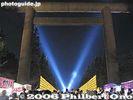
Yasukuni Shrine's main torii during Mitama Matsuri
|
|
|
|

Promenade to the shrine
|
|

Statue of Omura Masujiro (1824-1869) 大村益次郎, founder of Japan's modern army. Also pushed for the establishment of Yasukuni Shrine.
|
|

Spotlights create a silhouette of the statue of Omura Masujiro (1824-1869) 大村益次郎, founder of Japan's modern army.
|
|
|
|

A bon dance around the base of the statue.
|
|

Second torii
|
|
|

You wash your mouth hands here. Built in 1940 by Japanese living in the US. 大手水舎
|
|
|

Gate built in 1934. 神門
|
|

Spotlights hit the torii.
|
|

Back view of second torii
|
|
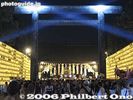
At night, 30,000 lanterns light up. A real summer spectacle.
|
|

Imperial crest on gate door
|
|
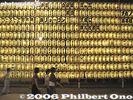
The lanterns are lit by lightbulbs, not candles.
|
|
|
|
|

Cherry blossom path to shrine
|
|

Tanabata streamers festoon the gate.
|
|
|
|
|

Noh stage and the cherry tree used as the barometer for Tokyo's cherry blossom blooming condition.
|
|

At 6:30 pm, a mikoshi portable shrine was paraded along the promenade.
|
|

Yasukuni Shrine, Torii and Haiden hall
|
|
|

Yasukuni Shrine, Haiden hall. After the Class-A war criminals (such as Hideki Tojo) were enshrined here, the late Emperor Hirohito (Showa) never worshipped here again. 拝殿
|
|
|

On Aug. 15, the anniversary of Japan's surrender and the end of World War II, Yasukuni Shrine is a busy with worshippers and police. These are police buses.
|
|

Police bus.
|
|

From Kudanshita Station to the first torii, the path is jammed with political activists not even related to the war or shrine.
|
|

Rising Sun flag
|
|

On Aug. 15 at Yasukuni Shrine, you can see former soldiers and nationalists dressed in military uniform marching in the shrine.
|
|
|
|
|

On Aug. 15 at Yasukuni Shrine, you can see former soldiers and nationalists dressed in military uniform marching in the shrine.
|
|
|

On Aug. 15 at Yasukuni Shrine, you can see former soldiers and nationalists dressed in military uniform marching in the shrine.
|
|
|
|
|
|

They march up to the end of the line of worshippers lined up to pray at the shrine. Then they turn around and head back.
|
|
|

Worshippers at Yasukuni Shrine on Aug. 15.
|
|

Worshippers at Yasukuni Shrine on Aug. 15.
|
|
|

Worshippers at Yasukuni Shrine on Aug. 15.
|
|

Praying at Yasukuni Shrine on Aug. 15.
|
|
|

Heavyweight judo Olympic gold medalist Satoshi Ishii (石井 慧) was also at Yasukuni Shrine on Aug. 15, 2009. He was very kind and signed autographs, shook hands, and took photos with a lot of people.
|
|
|
|
|
|
|
|
|
|

One of the giant spotlights used to accent the mikoshi, torii, and night sky.
|
|

Noh stage
|
|
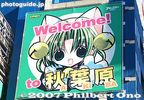
Welcome to Akihabara! (Or Akiba for short.) Japan and Tokyo's largest cluster of electronics shops.
|
|

The Sanno Matsuri Festival is one of Japan's Big Three Festivals and one of Tokyo's Big Three Festivals held in mid-June during several days. The main highlight is the Jinko-sai Procession held every two years. The 600-meter long procession consists of about 500 people parading through central Tokyo near the National Diet, Imperial Palace, Tokyo Station, and Ginza. It includes three portable shrines, carriages, and flower floats. Various events are also held at Hie Shrine which holds the festival. Jinko-sai Procession left Hie Shrine at 8 am on June 11, 2004. Before noon, they approach the Imperial Palace. 山王まつり神幸祭
|
|

Sanno torii gate and the West entrance. Escalator on the right. This torii style is unique to Hie Shrines. The shrine is nearest to Tameike-Sanno Station on the Ginza and Nanboku subway lines. 山王鳥居
|
|
|
|

The Jinko-sai Procession passes in front of the Imperial Palace.
|
|

Sanno torii gate 山王鳥居
|
|
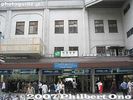
JR Akihabara Station
|
|
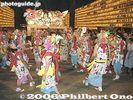
After the mikoshi, the Nebuta float and haneto dancers make an appearance.
|
|

Yushukan war museum 遊就館
|
|

Always a crowd in front of JR Akihabara Station
|
|

For a procession this large and grand, the crowd of spectators was extremely sparse. Good for photographers like me, but it was strange.
|
|

Sanno torii gate 山王鳥居
|
|
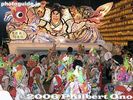
Rassera-rassera!
|
|

Entrance to Yushukan war museum 遊就館
|
|

Here's one reason for the crowd...
|
|
|
|
|

Yushukan war museum 遊就館
|
|

And another one. Young pretty/cute girls in costume pass out flyers, but end up being street models for amateur photographers who have no girlfriends to shoot.
|
|

Hie Shrine's Sanno Matsuri Jinko-sai Procession in front of Imperial Palace.
|
|

Shinmon Gate 神門
|
|

Nebuta float and haneto dancers. Also see the video at YouTube.Mitama Mtasuri at Yasukuni Shrine.
|
|

Inside Yushukan war museum. Impressive, but its version of Japanese war history is skewed. No exhibit on the Pearl Harbor attack either. 遊就館
|
|

They are happy to pose...
|
|
|
|

Shinmon Gate 神門
|
|

Awa Odori dancers also performed.
|
|

Inside Yushukan war museum: Photos of the war deceased. Look carefully and you may find photos of Hideki Tojo and co.
|
|

The maid costume is all the rage in Japan, for several years now.
|
|

One of the three portable shrines.
|
|

Shinmon Gate 神門
|
|
|

Yushukan war museum 遊就館
|
|

Santa suit appears in Dec.
|
|

The original procession included many high floats. However, due to overhead power lines and overpasses, such floats cannot be included.
|
|

Sacred Monkey sculpture (Shin'enzo) holding a real banana. The monkey is Hie Shrine's messenger believed to bring marital harmony and children. 神猿像
|
|
|
|
|

Coming out of Akihabara Station
|
|
|

Hie Jinja Shrine
|
|

Nebuta close-up
|
|

Memorial for military dogs which died.
|
|
|

Omiko Shrine maidens
|
|

Straw ring and Hie Jinja Shrine's Shaden Worship Hall. 社殿
|
|

Nice to see a bit of Aomori in Tokyo.
|
|
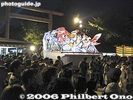
After the Nebuta made its way in front of the shrine, a short prayer was held.
|
|

Memorial for military horses which died.
|
|

Main drag of Akihabara
|
|

Flower float, Sanno Matsuri
|
|
|
|
|

Yushukan war museum 遊就館
|
|
|
|

Inside Hie Jinja Shrine's Shaden Worship Hall. 社殿
|
|

Mother Statue 母の像
|
|

Train bridge
|
|
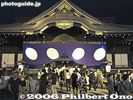
The shrine
|
|
|
|
|

Memorial for sunken naval warships
|
|

Train bridge
|
|

Rest stop near Sakashita-mon Gate at the Imperial Palace.
|
|
|

The Nebuta then went back to the promenade.
|
|

Memorial for Justice Radhabinod Pal, an Indian judge during the war crimes tribunal. He was a judge who voted for the innocence of Japan's war criminals.
|
|

Train bridge to Akihabara Station
|
|
|

Portable shrines
|
|
|
|
|

Under the train bridge is "Radio Center," a cluster of many little stalls selling electronic parts.
|
|
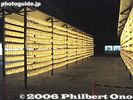
Lanterns
|
|
|

Shishimai Lion heads
|
|

Monument for kamikaze pilots who died.
|
|

Inside Radio Center, where many teens (and future electronics engineers) bought their parts to build their first radio or motor or whatever.
|
|
|

Shrine maidens dance in front of the three portable shrines near Sakashita-mon Gate.
|
|
|

Memorial for military horses and dogs which died.
|
|

One stall in Radio Center.
|
|

The lanterns are written with the names of the donors.
|
|
|

Storehouse for Sanno Festival floats
|
|
|

Other side of Akihabara Station
|
|
|
|

Storehouse for Sanno Festival floats
|
|

参集殿
|
|

Going down the main drag (Chuo-dori) of Akihabara.
|
|
|
|

Stage entertainment is also provided during the festival.
|
|

Rest house
|
|

Large and small electronics shops line the main drag on both sides.
|
|
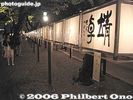
The bigger lanterns have artwork. Some of them were done by celebrities.
|
|
|
|
|

Garden 神池庭園
|
|

In autumn, we see fall leaves, a most appropriate sight in Akihabara because "Akihabara" means "Autumn leaves field."
|
|
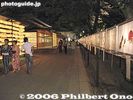
Path to the Yushukan war museum.
|
|

During this break period, the shrine priest and other representatives enter the Imperial Palace to pray for the peace, happiness, and prosperity of the Imperial family. Hie Shrine is the only shrine in Japan bestowed with this privilege.
|
|

Inari Sando torii gates 稲荷参道
|
|

Garden 神池庭園
|
|
|
|
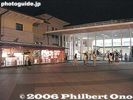
Yushukan war museum
|
|
|

Inari Sando torii gates are donated by individuals and companies for business prosperity. 稲荷参道
|
|

Entrance to sumo arena.
|
|

Akihabara has undergone a few transformations over the decades. From general electronics, to computers, and now anime and video games.
|
|

Some entertainment.
|
|

Inari Sando torii gates 稲荷参道
|
|

Next to the museum was a display of different lanterns, including a Neputa (left) and Nebuta (right).
|
|

Entrance to sumo arena
|
|

Akihabara is also undergoing a major physical transformation with the new Tsukuba Express train line, a revamped Akihabara Station, Yodobashi, and several skyscrapers.
|
|
|

Sanno torii gate leading to the Omotesando path to the shrine. 山王鳥居
|
|
|

Sumo arena. An exhibition sumo tournament is held every April.
|
|
|
|
|

Near Hie Shrine is (or was) Capital Tokyu Hotel where the Beatles stayed in 1966.
|
|
|

慰霊の泉
|
|

Akiba Square in the new Akihabara UDX (Crossfield) building next to Akihabara Station.
|
|
|

Neputa is from Hirosaki, Aomori Pref.
|
|

Food stands
|
|
|
|

Neputa closeup
|
|

Adding to the dignity of the shrine is a monkey show.
|
|
|
|
|

Near JR Akihabara Station is a new building called Akihabara UDX (Crossfield). On the 4th floor is this Tokyo Anime Center which has anime displays, a theater, and voice acting recording studio. Free admission.
|
|

Display case of dolls and cells
|
|

Anpan Man
|
|

Anime film
|
|

Maids to greet you
|
|

Maids, the costume rage in Japan for several years already.
|
|

Welcome!
|
|
|
|

Tokyo Anime Center
|
|

Many life-size costumed characters on display.
|
|
|

Tokyo Anime Center, Akihabara
|
|

Big expressive eyes.
|
|

Straight black hair is pretty too.
|
|

Blue ponytails
|
|

Goldilocks?
|
|

Space teen?
|
|
|

School uniform
|
|
|
|

Redhead in school uniform
|
|
|
|
|
|

The procession passes by Tatsumi Turret as it leaves the Imperial Palace.
|
|

Anybody who knows the names of these characters are welcome to enlighten me...
|
|

Sakura
|
|

Merry Christmas
|
|
|
|
|
|
|

Pikachu, Astro Boy, Doraemon
|
|
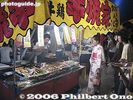
Food stall
|
|
|
|
|
|

Former site of Mitsubishi Bank to be transformed soon. This is also the intersection where Tomohiro Kato ran a truck through to hit and kill three pedestrians and went on a street rampage with a knife killing four others on June 8, 2008.
|
|
|

Don Quixote in the huge building which used to be Minami Denki.
|
|

A mikoshi passes by Tatsumi Turret of the Imperial Palace durng the Sanno Matsuri Jinko-sai.
|
|

Inside Don Quixote, Akihabara store
|
|
|

More fall leaves in Akihabara
|
|
|

On Sundays, the main drag is closed off to vehicular traffic, allowing us pedestrians to walk on the road.
|
|
|

It's also when some street performers start to sing.
|
|
|

Here's a cutie trying to gather attention.
|
|

Road to Tokyo Station.
|
|
| 1578 files on 7 page(s) |
1 |
 |
 |
 |
 |
|